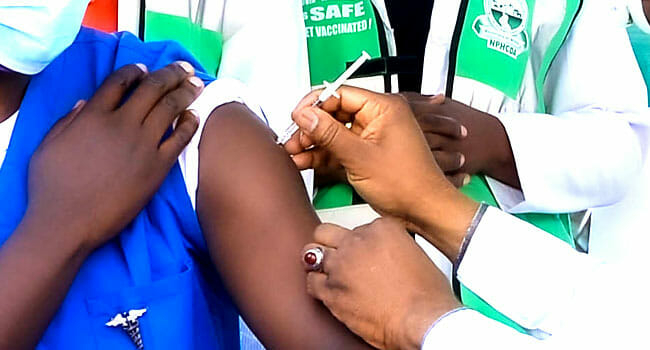Thousands of women may have skipped out on the Covid vaccination because they are concerned that it may interfere with their Botox, according to experts.
Some cosmetic clinics currently advise people who want Botox or dermal fillers to wait four weeks following their injection.
The precautions are based on a few occurrences in the United States of persons who received Botox or dermal filler treatment lately and experienced redness, swelling, and hard lumps after receiving an mRNA Covid shot.
Vaccine manufacturers like as Pfizer and Moderna, who supply doses for the UK’s booster program, produce these vaccinations.
These type of interactions with cosmetic injections are not unique to vaccines, and can also occur with viral illnesses, insect bites and allergies.
However, experts argue the perception of the risk, estimated to occur one in 5,000 cases, could be putting some women off getting a Covid booster.
Fewer than half of women in their 30s in England are fully vaccinated against Covid, according to the latest data from NHS England, and this figure drops to just a third for women in their 20s.
But they still have high uptake levels than men of a similar age, data shows.
This trend has been partially attributed to women being more likely to be employed in sectors such as health care which have been prioritised for vaccination and more likely to be proactive about their health in general.
Women in their 20s and 30s are a key target demographic for what is known as preventative Botox or filler treatments designed to delay the onset of wrinkles, or make certain features like their lips look bigger.
Currently, the NHS and UK Governments do not provide any information about the Botox and fillers interacting with Covid jabs.
Professor John Drury, an expert in social psychology from the University of Sussex, told MailOnline officials should address the Botox fears to ensure people are not left with doubts over the jab.
‘All the research shows that trust is the main predictor of vaccine uptake,’ he said.
‘It is important that all fears are addressed, which means listening to people to find out what their fears are.’
With trust such a key issue in the jab rollout, Professor Drury added that the government should act to address this concern directly to avoid young women being scared off getting the jab.
‘If the source of the fears is trusted, it could ward people off getting the vaccine,’ he said.
‘My concern is that for some young people these sources may be trusted more than the government.’
Dr Maximilian Kiener, an expert in vaccine ethics at Oxford University, also told MailOnline he was concerned that people could be put off Covid jabs by this perceived risk.
‘Various fears about vaccine-related side effect have already stopped people from getting a vaccine,’ he said.
‘So, it is likely that this fear will have an effect too.’
Dr Kiener said it was critical that health workers and authorities treat the Botox and vaccine question seriously as people who are concerned about in order to honestly engage with them.
‘Physicians need to be sensitive to the fears and concerns of any individual patient,’ he said.
‘When they obtain a patient’s consent, e.g. to vaccination, they need to take into account not only what the average person would consider relevant, but also what the individual patient considers relevant.
‘We shouldn’t restrict our focus only to what most people think is a reasonable or unreasonable concern but also be open to other views and honestly address each other’s perspectives.
‘In so doing, we are more likely to convince some people that their fears are unfounded and that they should get the jab as well as more likely to remind us that individual concerns deserve respect.’
He added that people should be encouraged to speak to health professionals about any concerns they have about a interactions between cosmetic injections and Covid jabs.
‘I suggest that, in addition to making information publicly available, we also encourage people to talk to their GPs or members of a medical team so that they do not need to rely solely on potentially misleading online information,’ he said.
As of the January 2, just over two million women aged between 18-and-34-years of age in England were fully vaccinated.
This represents about one in three of the population of women aged between 18-and-29 years of age, and 44 per cent of women in their early 30s.
In comparison five million women aged between 18-and-34-years-of-age got their first Covid jab.
Proportionally, women are more likely to get a Covid booster than men in all age demographics below 55-years-of-age.
Covid boosters have been rolled out based on age meaning older more members of older demographics have had their opportunity to get a booster with some younger people having only got their second Covid jab within the last three months.








Discussion about this post